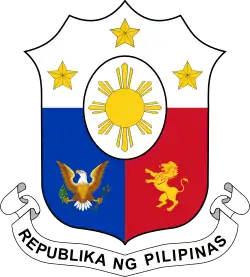Legislative district of Agusan
The legislative district of Agusan was the representation of the historical province of Agusan in the various national legislatures of the Philippines until 1969. Butuan also remained part of the province's representation even after becoming a chartered city in 1950.
 |
|---|
| This article is part of a series on the politics and government of the Philippines |
|
|
The undivided province's representation encompassed the present-day provinces of Agusan del Norte and Agusan del Sur, and the highly urbanized city of Butuan.
History
Initially being excluded from representation in the lower house of the Philippine Legislature in 1907, the then-non-Christian-majority areas of the Philippines — which included the Department of Mindanao and Sulu, of which Agusan was part — were finally extended legislative representation with the passage of the Philippine Autonomy Act in 1916 by the United States Congress. The Revised Administrative Code (Act No. 2711) enacted on March 10, 1917 further elaborated on the manner by which these areas would be represented.[1] The non-Christian areas were to be collectively represented in the upper house's 12th senatorial district by two senators, both appointed by the Governor-General.[1] Five assembly members, also appointed by the Governor-General, were to represent the seven component provinces of Department of Mindanao and Sulu — Agusan, Bukidnon, Cotabato, Davao, Lanao, Sulu and Zamboanga — in the lower house as a single at-large district. These arrangements remained in place despite the abolition of the Department in 1920.
The voters of Agusan Province were finally given the right to elect their own representative through popular vote beginning in 1935 by virtue of Article VI, Section 1 of the 1935 Constitution.[2]
During the Second World War, the Province of Agusan sent two delegates to the National Assembly of the Japanese-sponsored Second Philippine Republic: one was the provincial governor (an ex officio member), while the other was elected through a provincial assembly of KALIBAPI members during the Japanese occupation of the Philippines. Upon the restoration of the Philippine Commonwealth in 1945 the province retained its pre-war lone congressional district. When Butuan became a chartered city in 1950, it remained part of the representation of Agusan, per Section 89 of Republic Act No. 523.[3]
Republic Act No. 4979, approved by plebiscite held simultaneously with the 1967 elections, split the old Agusan Province into Agusan del Norte and Agusan del Sur and provided them each with a congressional representative.[4] In accordance with Section 7 of Republic Act No. 4979, the two new provinces first elected their separate representatives starting in the 1969 elections.[4]
Lone District (defunct)
- includes Butuan (chartered in 1950)
| Period | Representative[5] |
|---|---|
| 1st National Assembly 1935–1938 |
Apolonio D. Curato |
| 2nd National Assembly 1938–1941 | |
| 1st Commonwealth Congress 1941–1946 |
Elisa R. Ochoa |
| 1st Congress 1946–1949 |
Marcos M. Calo |
| 2nd Congress 1949–1953 | |
| 3rd Congress 1953–1957 |
Guillermo R. Sanchez |
| 4th Congress 1957–1961 | |
| 5th Congress 1961–1965 | |
| 6th Congress 1965–1969 |
Jose C. Aquino |
At-Large (defunct)
| Period | Representatives[5] |
|---|---|
| National Assembly 1943–1944 |
Elisa R. Ochoa[6] |
| Ramon Z. Aguirre (ex officio)[6] |
See also
References
- Philippine Legislature (1917). Revised Administrative Code of the Philippine Islands of 1917 (Act No. 2711) (Digitized Revised Administrative Code of the Philippine Islands of 1917 from the Presidential Museum and Library Collection, uploaded on February 15, 2016). Bureau of Printing. Retrieved February 4, 2017.
- Commonwealth of the Philippines (February 8, 1935). "The 1935 Constitution". Official Gazette of the Republic of the Philippines. Retrieved November 19, 2017.
- Congress of the Philippines (June 15, 1950). "Republic Act No. 523 - An Act Creating the City of Butuan". Official Gazette of the Republic of the Philippines. Retrieved November 19, 2017.
- Congress of the Philippines (June 16, 1967). "Republic Act No. 4979 - An Act Creating the Provinces of Agusan del Norte and Agusan del Sur". The LawPhil Project. Retrieved February 4, 2017.
- Congressional Library Bureau. "Roster of Philippine Legislators". Republic of the Philippines, House of Representatives. Retrieved February 7, 2017.
- Official program of the inauguration of the Republic of the Philippines and the induction into office of His Excellency Jose P. Laurel. Bureau of Printing. 1943.